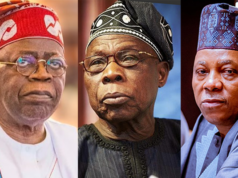
The Federal High Court in Abuja has plunged Nigeria’s judiciary into another controversy by sacking Governor Umahi of Ebonyi State and his deputy for changing parties.
In its Tuesday verdict, the court sacked Mr Umahi, and his deputy, Kelechi Igwe, for defecting from the Peoples Democratic Party (PDP), on whose platform they were elected in 2019, to the All Progressives Congress (APC).
The judge, Inyang Ekwo’s verdict contradicted recent verdicts of other courts of coordinate jurisdiction on the defections of other governors who similarly dumped the PDP for the APC last year.
Still smarting from last year’s embarrassing conflicting court orders issued by some judges on the same political matter, the Nigerian judiciary, with Tuesday’s verdict, offered a reminder of its perennial affliction of inconsistency and uncertainty of its sense of legal interpretation.
Prior to Mr Umahi’s defection in November last year, the Zamfara State governor, Bello Matawalle, had similarly dumped the PDP for the APC in June. Mr Matawalle’s defection was about a month after his Cross River State counterpart, Ben Ayade, left for the APC.
Court verdict on Matawalle’s defection
Mr Matawalle’s defection was challenged by some PDP members at the Gusau Division of the Federal High Court.
But in its judgment delivered on February 8, 2022, the judge, Bappa Aliyu, struck out the suit on the grounds that the court lacked jurisdiction to hear it, since it was neither a pre-election nor a post-election case.
Mr Aliyu added that the Nigeria constitution never prohibited a governor from defecting from one party to another.
He added that the constitutions of both the APC and PDP also did not make it unlawful for a governor to cross-carpet to other political parties recognised by the Independent National Electoral Commission (INEC).
The judge also ruled that the request by the plaintiffs to remove the governor on the grounds of defecting from the PDP, could not be granted, as only an election petitions tribunal or the state House of Assembly had the power to remove a governor from office.
Earlier court verdict on Umahi’s defection
Similarly, the Ebonyi State High Court in Abakaliki, the state capital, on February 28, dismissed a suit by a former senator, Sonni Ogbuoji, seeking the sack of Mr Umahi and his deputy on account of their defection to the APC.
Mr Ogbuoji, who represented Ebonyi South senatorial district in the Senate between 2015 and 2019, had urged the court to declare him the governor of the state having come second in the 2019 governorship election. Mr Ogbuoji was the APC governorship candidate in the election but lost to Mr Umahi, then of the PDP.
Dismissing the suit, the judge, Henry Njoku, held that Mr Umahi’s defection did not breach any provision of the Electoral Act or the Nigerian constitution to warrant his removal from office; a point similarly made by the Federal High Court in Gusau on Mr Matawalle’s defection.
The judge said the suit initiated against the governor was incompetent given that section 308 of the Nigerian constitution conferred immunity on him from criminal or civil proceedings while in office.
Abuja court’s departure
But in a striking departure from the other judgements, Mr Ekwo of the Federal High Court in Abuja, on Tuesday, sacked Mr Umahi, and his deputy because of their defection.
He similarly sacked 15 lawmakers who joined the governor in dumping PDP for the APC.
In sacking the governor and his deputy, he ruled that the votes polled by a political party could not be transferred to or utilised for the benefit of another political party or member of another political party.
The judge acknowledged that the constitution was silent on the implication of the defection of a governor or his deputy, but added that “such a lacuna was not to be celebrated or even mischievously flaunted as failure of a remedy for situations of such nature.”
In contradiction to the views of other judges, Mr Ekwo also held that that immunity from civil and criminal proceedings conferred on the president, the vice-president, governors, and their deputies, by section 308 of the constitution, did not apply to the case.
“In this case, the cause of action and the remedy thereof cannot wait till the third and fourth defendants leave office,” the judge said.
“The constitution is put in jeopardy when the will of the electorate who voted for a political party can be brazenly merchandised by candidates without consequence.
“The APC cannot govern Ebonyi State through the 3rd and 4th defendants (Messrs Umahi and Igwe), when it did not win the election that produced them,” Mr Ekwo added.
Confronted with the previous decisions of other courts of coordinate jurisdiction validating the defection of other governors, Mr Ekwo said they were not binding on him.
Controversy continues
In the ensuing controversy triggered by the Tuesday judgment, the PDP quickly presented Iduma Igariwey, a member of the House of Representatives, as the replacement for Mr Umahi, and Fred Udogwu to take the place of Mr Igwe.
But Mr Umahi insisted that he remains the governor. He also said he would not obey Mr Ekwo’s verdict as he had obtained judgments of other courts validating his defection.
He and his deputy have now filed their appeal against the judgment, which INEC says it is still reviewing.
But the judgment continues to divide legal circles, with some lawyers insisting that it cannot stand the scrutiny by the appellate courts, while others are saying the issues are not that clear.

A Senior Advocate of Nigeria, Mike Ozekhome, argued in an article that the judgment conflicted with the previous decisions of the Court of Appeal and the Supreme Court.
Citing the 2012 decision of the Supreme Court in Ngige versus Akunyili, Mr Ozekhome maintained that Mr Ekwo was wrong “to hold that votes scored by a candidates belong to a political party and therefore not transferable”.

“The courts have since gone over the era of Amaechi V. INEC, where the Supreme Court had held that votes cast in an election belong to a political party,” the senior lawyer argued.
Mr Ozekhome also said the verdict was against “Section 308 of the constitution which grants absolute immunity to the president, vice-president, governor and deputy-governor from being proceeded against in any civil or criminal proceedings.”
He added that the governor and his deputy “could not have been sued at all, to be removed from office for defecting, this not being a pre-election or post-election matter covered by the Fourth alteration to the constitution, and which expired well over two years ago.”
He also cited the Supreme Court’s decision on the defection of then Vice-President Atiku Abubakar to the defunct Action Congress ahead of the 2007 presidential election, to say that “Atiku could defect without losing his seat”.
But speaking on Channels Television’s Sunrise Daily, on Wednesday, another senior advocate, Paul Obole, said the issues were not as clear cut as the critics of Mr Ekwo’s judgment suggested.
“Because as many cases you will find for, you probably could find a similar number against,” Mr Obole said.
He said, for instance, the Supreme Court which previously ruled that the ballots belonged to the candidate, indicated in 2016 in the case filed by James Faleke concerning the 2015 Kogi State governorship election that they belonged to the political party.

He added that while the Nigerian constitution was clear that lawmakers who change parties could lose their seats, “It is not crystal clear for governors.”
He urged the National Assembly to take advantage of the ongoing constitution amendment process to clearly spell out the implication of defection by the president and the vice-president as well as by governors and their deputies.
“Once it is clear in the constitution, it makes the tasks easier for judicial interpretation,” he said.
But, another senior advocate, Kunle Adegoke, who also appeared as a guest on the Channels Television’s programme, insisted that the Federal High Court’s interpretations in Tuesday’s judgment were against subsisting pronouncements of the Supreme Court.

“The Supreme Court has said the defection of the president or the vice president which applies to governors and deputy governors could not be a ground for removal from office,” he said, adding “That is settled and there has not been any contrary pronouncement to that effect.”
He, however, supported the call on the National Assembly to amend the constitution to expressly make defection part of the grounds for the removal of president, the vice-president, governors and deputy governors.
Although, the final decision on Mr Umahi’s case will eventually come from the Supreme Court, the poignant question to ask is whether the Nigerian judiciary will ever be healed of its plague of inconsistency especially when they are cases involving political figures.







